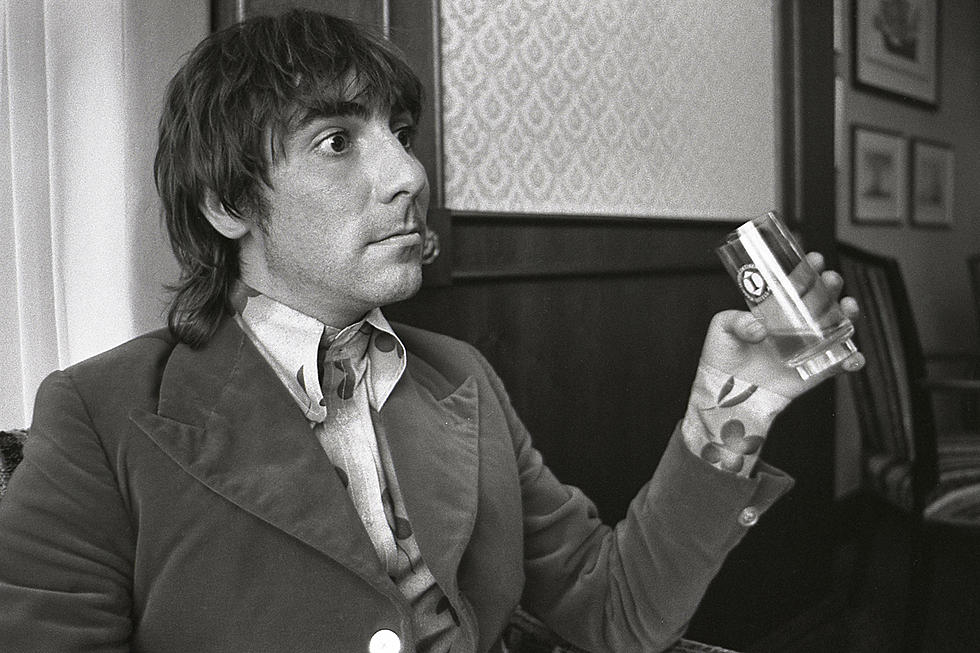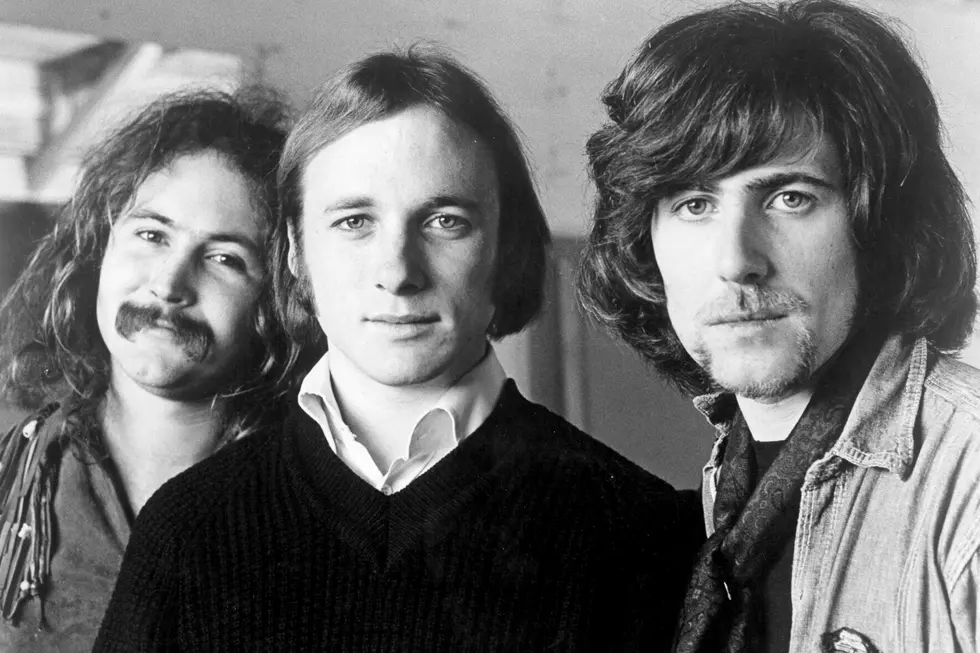
How the Fixx Stayed True Then Hit Big Anyway on ‘Reach the Beach’
The Fixx's meteoric breakthrough didn't arrive courtesy of some sweeping overhaul. They had basically the same lineup, save for a switch at bass. Producer Rupert Hine was back on board for their second MCA studio project too.
Debut album cuts like the No. 72 Billboard hit "Stand or Fall" or the No. 101 finisher "Red Skies" possessed the same post-punk New Wave DNA as their new songs. Cy Curnin's seductive vocal style offset against Jamie West-Oram's riffy-then-ethereal guitar and Rubert Greenall's synth washes, with drummer Adam Woods as the engine.
And yet Reach the Beach, the Fixx's sophomore release, soared to No. 8 on the Billboard chart after its release on May 15, 1983. They got there on the power of three consecutive Top 40 hits, including the No. 4 smash "One Thing Leads to Another."
What changed? Only everything, in the form a new network called MTV. All of sudden, the Fixx were must-see television, then out on tour with the Police. Then, selling platinum records.
"It was a fun time," Curnin told The (Fall River, Mass.) Herald News in 2015. "Bands in the '70s had to work a lot harder [to become known]. Along came MTV and our videos were plastered all over TV, and we had a matter of months to adjust to the fame."
A smart, topical focus also remained, as the Fixx – who'd memorably meditated on the fallout after a nuclear holocaust on "Red Skies" – continued to mix in the personal with the political.
"We were a little bit beyond the 'party-on' crowd," Curnin told MLive in 2013. "What was going on in the headlines was interesting to us. The band was formed when Reagan and Thatcher were having their political marriage, the Cold War was coming to a head, deregulation was in, and credit cards were being thrown at people."
Watch the Fixx Perform 'One Thing Leads to Another'
He noted that the arrival of Reach for the Beach, just before summer got underway, synced up perfectly with its title. Things slow down in the warmer months, Curnin said, offering time for reflection.
"I always felt that the music you need to hear is not January but summer," he told Lars Hindsley in 2009. "The summer period, you would go to the beach and you felt almost like you would do all your emotional growing and transformation during the summer. Peer pressure, school, life, all would like disappear, and the self was there: loneliness, inspiration, early love, growth. And so Reach the Beach represented all of those elements."
"One Thing Leads to Another," a biting critique of flip-flopping career politicians, was issued that August. "In some ways, it was simple. Great guitar hook. One-chord song. Enigmatic words that ring as true today as they did then: Lies and politics don't mix, but we always have to suffer these fools," Curnin mused in a talk with the Chicago Music Guide in 2012. "When will they learn that they are our servants, not our masters?"
Fast forward a few decades, and the song's message still rang true, Curnin added. "If you're going to be a liar, you'd better be a damn good liar and remember what you said, or the whole thing's going to get pear shaped," he told Songfacts in 2012. "That was 30 years ago, and look where the system is now. A lot of people stand on ballot boxes and say a lot of things and lie in order to get elected and do nothing."
Of course, your average MTV viewer might not have picked up on any of this, between Curnin's elliptical approach with the lyric and the way it was all tucked into the Fixx's canny blending of of-the-moment sounds. That's a credit to the meticulous approach they've always taken in the studio.
"We came up with this very aggressive bite-y but sort of shiny guitar, which was very different than any other bands at that time," Hine told Songfacts in 2011. "And that certainly was a huge part of the band's success. I mean, the amount of interest that went into the guitar was huge – quite rightfully, I think. Also, the whole production technique we came up with was very new at that time – and still, in a way, sounds unique."
Watch the Fixx Perform 'The Sign of Fire'
Curnin was proud to have pushed back against the status quo, whether that became a focus for their newest fans or not. "Politicians just lie to get elected and then forget what they said. It's all bullshit," Curnin told MLive. "As a band, we like to remind people of that and to not just lie there like sheep, and to wake up to their own responsibilities."
By then, "Saved by Zero" – a song built off zen teachings – had already become the Fixx's first Top 20 hit in the U.S. In times of worry and strife, its calming theme was in many ways just as important.
"It was a sort of a mantra that came from some of the teachings that I was learning back then with my earliest dipping into Buddhism," Curnin told Songfacts. "It was East meeting West for me. It was Eastern ancient philosophies that people live as a daily code over there to necessity. And we in the West absorbing this Buddhism, at the time it wasn't a necessity for functioning life, but it was a necessity for calming the mind and getting to a place of no mind and losing frustration and ego. So, that's where it was for then."
"The Sign of Fire" later went to No. 32, completing a run of charting songs that will always define Reach the Beach, despite the presence of underrated deep cuts like the spry "Liner" and their darkly ambient closing track "Outside." The album ended up selling two million copies in the U.S. alone.
There was, alas, nowhere to go but down. Phantoms, their weightier, far more considered 1984 follow-up, got to only No. 19 – and each successive album did worse. They collected two more Top 20 singles, including 1986's terrific "Secret Separation," before breaking up for a while.
Watch the Fixx Perform 'Saved by Zero'
"When we had the hits, it was all fine and dandy," Curnin told the Chicago Tribune in 1989. "The next thing they knew, this group that had been playing pretty upbeat stuff came out with a dark album. It didn't sell well, and things got nasty pretty fast."
Their label asked for a greatest-hits album in order to bolster sales, a clear sign that the relationship was breaking down. "When the MCA people stopped talking and starting lecturing," Curnin added, "it was pretty clear that it was 'Good night, Vienna' as far as MCA was concerned."
Eventually, AXS was moved to ask: "Whatever Happened to the Fixx?" Well, fame happened. Curnin said the Fixx played before a million and a half people in a scant three months. Just as quickly, however, it vanished.
"I'm not crying about it. We were all very happy. There was a lot of pluses to it," Curnin told Classic Bands in 2012. "But in life, we quickly learned that when you go through the looking glass, with success comes a kind of responsibility and also decisions because you can either say no to the 18-month tour and not support the career, or you could say yes. Well, is your wife going to be waiting for you 18 months later? Is she gonna want to come on the road? The answer," he concluded with a sad chuckle, "is no."
The Fixx had entered a period of loss – first of their commercial momentum, and then of the band itself.
Top 40 New Wave Albums
More From KYBB-FM / B102.7










